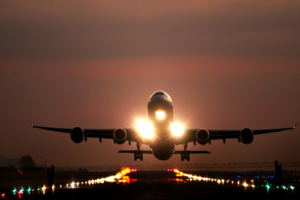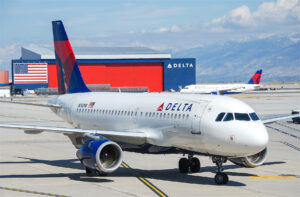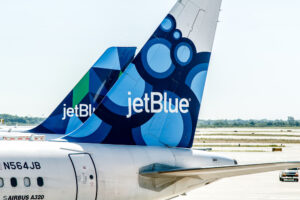Why Don't Airlines Just Raise Their Fares to Meet Fuel Costs?
#16
FlyerTalk Evangelist
Join Date: May 2004
Location: Soon to be LEGT
Posts: 10,928
The fact that AA can't market a differentiated product doesn't mean that there is no demand for a differentiated product.
#17
Join Date: Apr 2001
Posts: 775
I heard another one of those discussions on a business/news show about how tough it was to be in the airline business. The main problem, they said, was the rising cost of oil and, hence, jet fuel.
Every business I know or have ever been involved with passes on the cost of doing business to its customers. It's the only way to stay in business. Recently, we hired a local mover and he added a surcharge to his rates for increased fuel costs. All of our local limo services have raised their rates for rides to the airport because of increased fuel costs. Our propane delivery company raised their rates, as did our Culligan delivery. No one was afraid they would lose business to their competitor, because they know if they don't raise their rates, they won't be able to stay in business anyway.
Every business I know or have ever been involved with passes on the cost of doing business to its customers. It's the only way to stay in business. Recently, we hired a local mover and he added a surcharge to his rates for increased fuel costs. All of our local limo services have raised their rates for rides to the airport because of increased fuel costs. Our propane delivery company raised their rates, as did our Culligan delivery. No one was afraid they would lose business to their competitor, because they know if they don't raise their rates, they won't be able to stay in business anyway.
In the examples you gave, if the local mover, say, started charging a lot more than other movers in his area, he'd start losing business. That might happen if the other companies used more fuel-efficient vehicles, and were able to absorb the higher fuel pricies more easily. Then your company would be forced to keep his prices down in order to keep his market share. Yes, it would be bad for his bottom line, but so would losing his customers. Which would be better would be a business decision made based on the exact circumstances.
Ed
#18
Suspended
Join Date: Jul 2005
Posts: 2,716
In terms of hedging, lets not forget that many companies have been in Chapter 11 protection which limits their ability to hedge against future fuel prices.
"So why don't the airlines just do the same thing? Please don't say it's competition. Other businesses compete - why can't the airlines?"
They do compete. Quite vigorously. They have a fickle clientelle, a very complicated international business, high labor costs and highly variable costs. To say that airlines don't compete is just not true. There's a reason why you see mergers and bankruptcies. They compete quite vigorously. That's one of the reasons why each airline can't raise prices as they see fit without taking into account the competition and the market. Raising prices too much can mean half empty planes or a lower overall ticket price.
"Similarly, Egyptair business class is markedly cheaper than Singapore Airlines business class, yet there's no shortage of people flying on the latter (many of whom are paying out of their own pocket, I may add). Premium Economy is also appearing on an increasing number of airlines, and you can bet that airlines will be charging a premium for it over WHY."
While this might be true for international first class, try any heavily travelled route that includes discount carriers. People's primary purchase choice is price. As someone noted, AA tried a more room throughout coach promotion where they gave more legroom to everyone on the flight. In the end it failed because people weren't interested in paying for a higher level of service. Service might be a huge issue for those who don't see the flight price as an issue, but that is not most people.
"So why don't the airlines just do the same thing? Please don't say it's competition. Other businesses compete - why can't the airlines?"
They do compete. Quite vigorously. They have a fickle clientelle, a very complicated international business, high labor costs and highly variable costs. To say that airlines don't compete is just not true. There's a reason why you see mergers and bankruptcies. They compete quite vigorously. That's one of the reasons why each airline can't raise prices as they see fit without taking into account the competition and the market. Raising prices too much can mean half empty planes or a lower overall ticket price.
"Similarly, Egyptair business class is markedly cheaper than Singapore Airlines business class, yet there's no shortage of people flying on the latter (many of whom are paying out of their own pocket, I may add). Premium Economy is also appearing on an increasing number of airlines, and you can bet that airlines will be charging a premium for it over WHY."
While this might be true for international first class, try any heavily travelled route that includes discount carriers. People's primary purchase choice is price. As someone noted, AA tried a more room throughout coach promotion where they gave more legroom to everyone on the flight. In the end it failed because people weren't interested in paying for a higher level of service. Service might be a huge issue for those who don't see the flight price as an issue, but that is not most people.
#19
FlyerTalk Evangelist
Join Date: May 2004
Location: Soon to be LEGT
Posts: 10,928
Care to guess how many are operated by LCCs? Six. That means 14/20 flights are carried out by full-service airlines, which most of the time do charge quite a bit more than the one lowcost that hasn't been run off the route.
Or MAD-BCN. 4.5 million pax per year.
3 out of 4 carriers flying it are FSCs. There is massive competition, and they had to do away with free catering and full miles for the cheap fares, but they still offer a FSC service (assigned seats, elite benefits, business class option). And they are (a bit) more expensive than the LCC.
One of the carriers flying on this flagship route is having serious financial problems. Can you guess who?

#21
Suspended
Join Date: Sep 2006
Programs: AAdvantage PP
Posts: 13,913
I heard another one of those discussions on a business/news show about how tough it was to be in the airline business. The main problem, they said, was the rising cost of oil and, hence, jet fuel.
Every business I know or have ever been involved with passes on the cost of doing business to its customers. It's the only way to stay in business. Recently, we hired a local mover and he added a surcharge to his rates for increased fuel costs. All of our local limo services have raised their rates for rides to the airport because of increased fuel costs. Our propane delivery company raised their rates, as did our Culligan delivery. No one was afraid they would lose business to their competitor, because they know if they don't raise their rates, they won't be able to stay in business anyway.
So why don't the airlines just do the same thing? Please don't say it's competition. Other businesses compete - why can't the airlines?
Maybe someone with more insight than I have can offer an answer to this perplexing question.
Every business I know or have ever been involved with passes on the cost of doing business to its customers. It's the only way to stay in business. Recently, we hired a local mover and he added a surcharge to his rates for increased fuel costs. All of our local limo services have raised their rates for rides to the airport because of increased fuel costs. Our propane delivery company raised their rates, as did our Culligan delivery. No one was afraid they would lose business to their competitor, because they know if they don't raise their rates, they won't be able to stay in business anyway.
So why don't the airlines just do the same thing? Please don't say it's competition. Other businesses compete - why can't the airlines?
Maybe someone with more insight than I have can offer an answer to this perplexing question.
The problem is, and has demonstated with the "tech crash" and the subsequent fall out for 9/11, when the high end fares ebb due to economic or other reasons, airlines start to suffer and a number of them have gone out of business. The question becomes is this a sustainable business model over the long run. Also, this business model forces airlines to operate by the skin of their teeth which is why the system can go into total disray so easily.
#22
Join Date: Dec 2002
Location: eastern Europe & NC
Posts: 4,527
Add-ons like fuel surcharges are just dishonest marketing. Fuel happens to be part of the product, not something extra.
Its like some countries where currency exchange houses charge both a differential between buying and selling rates AND a commission. Trying to compare rates when you have to compare two variables is extremely difficult for a consumer. I have been known to tell those operating currency exchange booths which double dip in that fashion that it is a dishonest practice. Fortunately, in the country where I now work, almost no exchange houses charge a commission.
I also like the more honest European hotel pricing. When you are quoted a price by a hotel in the United States, there will ALWAYS be add-ons. In Europe, the price you are quoted is the final price, with taxes and everything included.
Its like some countries where currency exchange houses charge both a differential between buying and selling rates AND a commission. Trying to compare rates when you have to compare two variables is extremely difficult for a consumer. I have been known to tell those operating currency exchange booths which double dip in that fashion that it is a dishonest practice. Fortunately, in the country where I now work, almost no exchange houses charge a commission.
I also like the more honest European hotel pricing. When you are quoted a price by a hotel in the United States, there will ALWAYS be add-ons. In Europe, the price you are quoted is the final price, with taxes and everything included.
#23
A FlyerTalk Posting Legend
Join Date: Oct 2002
Location: back to my roots in Scotland!
Programs: Tamsin - what else is there to say?
Posts: 47,843
If they add it as a surcharge, they get to charge us for it when we get our 'free' award tickets. Last BA 'free' redemption cost me $450 dollars. $160 of that is for the UK taxes - most of the rest is from fuel and security surcharges 





#24
Join Date: Feb 2002
Location: BNA
Programs: HH Gold. (Former) UA PP, DL PM, PC Plat
Posts: 8,221
The airline's yield management programs are already pushing the fares as high as the market will bear. Increasing fuel prices do not increase the amount that the passengers are willing to pay for air travel. If anything, they decrease the amount the passengers are willing to pay because the higher fuel prices are also effecting them in other areas.
#25
FlyerTalk Evangelist
Join Date: Mar 2004
Location: Under an ORD approach path
Programs: DL PM, MM. Coffee isn't a drug, it's a vitamin.
Posts: 12,935
As a result, those who typically have not done a good job of hedging are more likely, it would seem, to add the fuel surcharge so they can appear to have the same ticket price in the GDS's as the airline who does not feel they need to raise their ticket prices since they have managed this expense better by hedging.
Still, when load factors are as high as we've seen lately, the airlines need to charge more; off season I can fly TATL for the same price that I paid in 1974(about $500). What other product costs the same now as it did then?
Seems like some airlines follow the philosophy to "lose money on every transaction and make it up on volume".
#26
FlyerTalk Evangelist
Join Date: May 2001
Location: LAX; AA EXP, MM; HH Gold
Posts: 31,789
Just this morning, WN announced its regular $49 to $99 one-way fare sale. Like it periodically has done for years and years. Gotta try to fill those seats in the slow season.
Why don't airlines just raise fares? LarryJ hinted on the teachings of Econ 101 which suggests that sometimes fare hikes don't maximize revenue - and occasionally, max revenue is what they airlines need (or think they need). Cash flow is sometimes more important than GAAP profits. Cash keeps you in biz to fight another day for those much hoped-for profits.
As for fuel surcharges: Many corporate discount contracts don't discount fuel surcharges. If airlines raised the base business-traveler fares by $x, the typical corporate discount would mean the airlines would only get 50% - 75% of $x. Increasing the fuel surcharges mean that the airline gets all of the $x increase, assuming that demand for those full fares doesn't drop off as a result of the increase.
Originally Posted by Gargolyle
Still, when load factors are as high as we've seen lately, the airlines need to charge more; off season I can fly TATL for the same price that I paid in 1974(about $500). What other product costs the same now as it did then?
Mainline Yields (average fares paid per mile) at the US-based legacy airlines fell off a cliff after September 11, 2001 and still have not recovered to their levels of 2000. At most airlines, yields dropped 25% to 40% below their 2000 levels. Maybe they'll get back there someday, but probably not for 2007. Maybe in 2008 or 2009. Passengers need to pay more, but everyone likes the $200 plan in advance transcon fare. When fuel was $0.55/gal (1998-99), those fares weren't a problem. The spot price for fuel is now bumping up near $3.00/gal. Fares gotta go up. Only problem is whether enough people will pay those higher fares.
#27
Moderator, Hilton Honors
Join Date: Nov 2003
Location: on a short leash
Programs: some
Posts: 71,423
Sure. Let's try London to Amsterdam. Heavily travelled route. Short haul, little to no premium seating available. Many different types of traveller (bankers going to meetings, students going to coffeeshops, families connecting to longhaul...the lot). There are 5 carriers plying it, using all 5 terminals corresponding to the LON code. Around 20 flights each way every weekday. Oh, and train connections are reasonably convenient as well.
Care to guess how many are operated by LCCs? Six. That means 14/20 flights are carried out by full-service airlines, which most of the time do charge quite a bit more than the one lowcost that hasn't been run off the route.
Or MAD-BCN. 4.5 million pax per year.
3 out of 4 carriers flying it are FSCs. There is massive competition, and they had to do away with free catering and full miles for the cheap fares, but they still offer a FSC service (assigned seats, elite benefits, business class option). And they are (a bit) more expensive than the LCC.
One of the carriers flying on this flagship route is having serious financial problems. Can you guess who?
Care to guess how many are operated by LCCs? Six. That means 14/20 flights are carried out by full-service airlines, which most of the time do charge quite a bit more than the one lowcost that hasn't been run off the route.
Or MAD-BCN. 4.5 million pax per year.
3 out of 4 carriers flying it are FSCs. There is massive competition, and they had to do away with free catering and full miles for the cheap fares, but they still offer a FSC service (assigned seats, elite benefits, business class option). And they are (a bit) more expensive than the LCC.
One of the carriers flying on this flagship route is having serious financial problems. Can you guess who?

#28
Join Date: Aug 2006
Location: MUC (home), DUS (office), XXX (customer)
Programs: LH, AB, SPG, CC, Sixt, EC
Posts: 6,334
I haven't read the entire thread but I am quite happy they don't.
So plenty of tickets that have a fare of let's say 10 EUR and the rest (another 90 EUR) are fees and taxes are basically fully refundable. All you loose are 10EUR. Let's assume that fuel would be added to the fare... We would loose way more money with nonrefundable tickets!
So plenty of tickets that have a fare of let's say 10 EUR and the rest (another 90 EUR) are fees and taxes are basically fully refundable. All you loose are 10EUR. Let's assume that fuel would be added to the fare... We would loose way more money with nonrefundable tickets!
#29
FlyerTalk Evangelist
Join Date: May 1998
Location: Massachusetts, USA; AA Plat, DL GM and Flying Colonel; Bonvoy Platinum
Posts: 24,241
It's not just airlines. When the University of Massachusetts campuses were told to hold their tuition constant, they did - but raised "fees" to collect what the tuition increase would have been. Ditto for a bazillion other examples in many different fields. Perception isn't reality. Sometimes perception matters more.
#30
FlyerTalk Evangelist
Join Date: May 2004
Location: Soon to be LEGT
Posts: 10,928
plenty of tickets that have a fare of let's say 10 EUR and the rest (another 90 EUR) are fees and taxes are basically fully refundable. All you loose are 10EUR. Let's assume that fuel would be added to the fare... We would loose way more money with nonrefundable tickets!





















